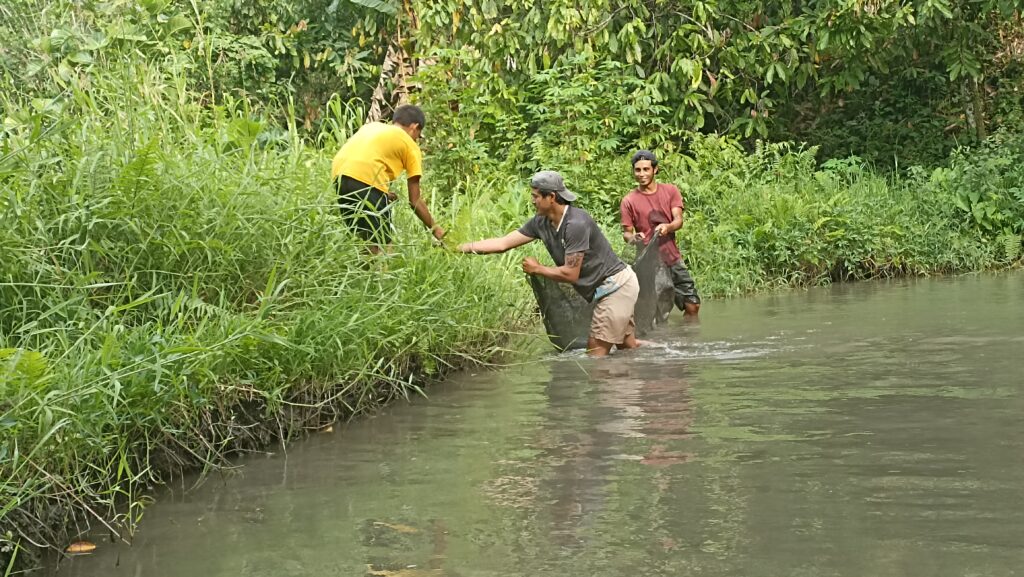In Moa Village, Mr Heriyanto's leadership as Village Head since 2022 has brought significant changes. Especially in involving indigenous women in the village planning and management process. He told how women have a special correlation and relationship in village planning and management. According to Minister of Home Affairs Regulation Number 114 of 2014 concerning Village Development Guidelines, each village is required to establish Village Regulations regarding work plans for 2024.
In general, these regulations only facilitate the exploration of ideas or the absorption of aspirations per hamlet. However, in Moa Village, Heriyanto has fought for the active involvement of women in the planning process by providing special space for women's groups. He has formed separate forums and set special times for them so that women's aspirations and needs can be accommodated more effectively.
Heriyanto also emphasized the role of women in managing natural resources, who had been building commitment since before the Minister of Home Affairs regulations came into existence. This continues to be realized in village programs and planning, especially through the ESTUNGKARA program with KEMITRAAN Indonesia.
Uchu, a native of Moa village and facilitator of the ESTUNGKARA program, said, Indigenous women have roles determined by the zoning of life in the village. Which always coexists with nature.
In this zoning, women have a role in the residential zone (damn), zone pampa (household staple farming area), zone bonea (rice fields), zone wana (hunting activity), and zone Wang Kiki (a place where community activities are prohibited).
Remembering that several years ago, Moa village was just given recognition as a customary forest of around 1400 hectares. Which is far from the proposed figure of around 7,700 hectares. Even though it is far from the proposed figure, it is still a struggle for the village head, community, program assistants, and Karsa Institute.
"If you look at the post-determination response given by the state to Moa village, it is indeed a joy. "But if you look at the area of only 1400 hectares that was given, we actually quite don't accept the results of the decision," said Uchu.
However, the commitment of the village government, program assistants, and Karsa Institute to continue making efforts to prove to the government that the Moa village community plays many roles in protecting the forest area. This will also continue in planning discussions involving women. For example, after the establishment of customary forests. Where a business group is established which aims to manage the given customary forest area.
The women's forum formed in the ESTUNGKARA program has made a major contribution to strengthening the role of women in the village planning process. Women are considered thinkers and feelers who pay attention to aspects that are often overlooked by men. An example of this women's forum is when they advocate for improving road access from the village to the sub-district capital, which is often considered trivial by other parties.
Apart from that, the women's forum has also carried out advocacy related to food security interests. Moa Village was asked to allocate village funds to strengthen food security, including through the use of local wisdom such as Pampa.
The biggest challenge faced is the adoption of modern agriculture by indigenous communities, which is not yet fully in accordance with local wisdom. This can reduce the role of women in managing natural resources, which were previously owned and held closely by women. Therefore, it is necessary to establish village regulations that protect areas with certain local wisdom, such as Pampa.
Through collaboration with the Karsa Institute, Moa Village has facilitated the formation of business groups, especially those involving women. This opens up opportunities for women to be more actively involved in local economic development. In addition, through customary forest management, women can participate in compiling and documenting their local wisdom.
Not only that, the Karsa Institute has also facilitated the inclusion of disability groups in village activity management teams. Although it still faces challenges in being considered an object group, this step shows a commitment to involving all levels of society in the village development process.
Thus, Moa Village under the leadership of Mr Heriyanto has demonstrated a strong commitment to building an inclusive and sustainable village. By strengthening the role of women and maintaining local wisdom as a valuable asset in managing natural resources and village development.
*This article was written by: Fiky Yudhistira_Internship Student ESTUNGKARA_FISIPOL UGM 2023


